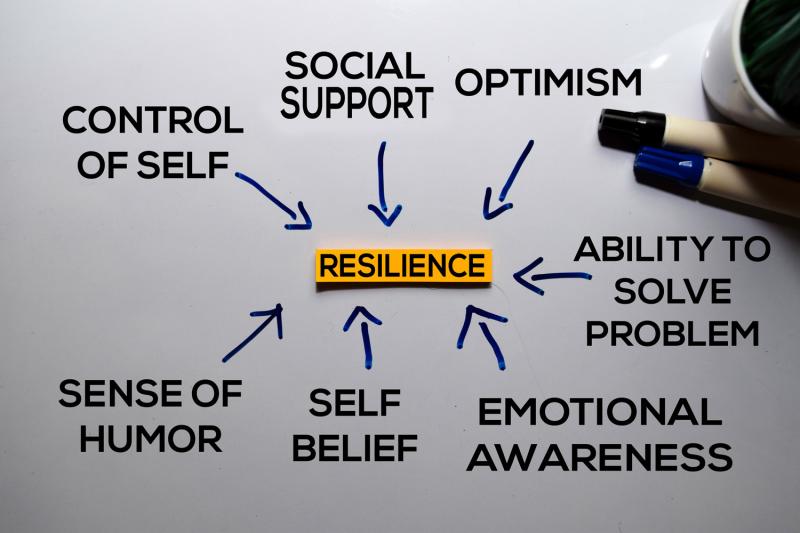Key points
- Personal interventions attempt to increase aged care worker’s psychological resources to cope with workplace stressors.
- The review findings found three categories of personal interventions, including self-care, mindfulness, and gratitude intervention.
- The review findings reported a total of eleven different interventions: six self-care, four mindfulness, and one gratitude intervention.
Burnout is an individual reaction in response to high job demands and low job resources. [1] Individuals who are burnt out exhibit high levels of emotional exhaustion, depersonalisation, and low levels of accomplishment. [1] Aged care workers are especially at risk in developing burnout due to the chronic interpersonal stressors of their work and can negatively affect the quality of work performance. [2-4] Implementing suitable interventions, whether at the individual or organisational level, or through a combination of both, can mitigate burnout among aged care workers. [2] Personal interventions attempt to increase aged care worker’s psychological resources to cope with workplace stressors. [5] Organisational interventions focuses on changing the occupational context to reduce sources of stress within the workplace. [5] A combined intervention takes on both personal and organisational perspectives. [5] A separate evidence theme was developed, reporting organisational interventions within the research. There were no findings on combined interventions relative to staff burnout for aged care workers.
This evidence theme on personal interventions is a summary of one of the key topics identified by a scoping review of the staff burnout research. If you need more specific or comprehensive information on this topic, try using our PubMed searches provided below.
The 2022 scoping review found nine studies on personal interventions to mitigate burnout among aged care workers. [6-14] The 2023 update found an additional four studies that contributed to this theme. [15-18] This evidence theme provides research findings on effective personal interventions for the aged care workforce. Personal interventions were allocated into three categories including:
- Skill Training (six interventions): self-care skills, compassion fatigue awareness training, stress management, refocus emotion regulation, improve skills on understanding and supporting challenging behaviour, participatory action-research (PAR) intervention. [6, 7, 12, 15]
- Mindfulness (four interventions): yoga, mindful meditation, mindfulness-based stress reduction, mindfulness based cognitive therapy. [11, 17, 18]
- Gratitude (one intervention): gratitude journal. [16]
A list of interventions is available below, which report on delivery, significant (improvement and deteriorating) and non-significant outcomes, and duration of effectiveness.
*Note: Burnout subscales include emotional exhaustion, depersonalisation, and personal accomplishment.
Skills training intervention
Self-care skills [7]
- Mode of delivery: In-person
- Significant improvement outcomes: Increased staff retention, quality of life, compassion satisfaction, and personal. accomplishment. Decreased emotional exhaustion, depersonalisation, secondary traumatic stress.
- Significant deteriorating outcomes: No outcome identified.
- No significant outcomes: No outcome identified.
- Duration of effectiveness: 1 to 4 months.
The self-care skill was a 90-minute interactive educational presentation which included 12 short videos embedded in the presentation (What is in your self-care skills toolbox?)
Compassion fatigue awareness training [7]
- Mode of delivery: In-person
- Significant improvement outcomes: Increased staff retention, quality of life, compassion satisfaction, and personal. accomplishment. Decreased emotional exhaustion, depersonalisation, secondary traumatic stress.
- Significant deteriorating outcomes: No outcome identified.
- No significant outcomes: No outcome identified.
- Duration of effectiveness: 1 to 4 months.
Stress management [6]
- Mode of delivery: Web-based
- Significant improvement outcomes: Decreased emotional exhaustion and depersonalisation.
- Significant deteriorating outcomes: No outcome identified.
- No significant outcomes: There were no statistically significant differences in personal accomplishment outcomes.
- Duration of effectiveness: Post-intervention, 1 month.
Refocus emotion regulation [12, 14]
- Mode of delivery: Not reported [12, 15]
- Significant improvement outcomes: Decreased depersonalisation, cynicism, and social distancing. [12, 15]
- Significant deteriorating outcomes: No outcome identified. [12, 15]
- No significant outcomes: There were no statistically significant differences in emotional exhaustion and personal. accomplishment outcomes. [12, 15]
- Duration of effectiveness: Not measured. [12, 15]
Improve skills on understanding and supporting challenging behaviour [8-10, 13]
- Mode of delivery: In-person training session [8-10, 13]
- Significant improvement outcomes: Increased job satisfaction, [10] quality of life [8], and feelings of burnout. [13]
- Significant deteriorating outcomes: No outcome identified.
- No significant outcomes: There were no statistically significant differences for burnout (all-subscale) outcomes. [8-10]
- Duration of effectiveness: Not measured, [10, 13] 4-months, [9], 7 months. [8]
*Note: The study by Smythe et al. [13] reported qualitatively on burnout outcomes.
Participatory action research (PAR) intervention [14]
- Mode of delivery: In-person
- Significant improvement outcomes: No outcome identified.
- Significant deteriorating outcomes: No outcome identified.
- No significant outcomes: Burnout (all subscales).
- Duration of effectiveness: 12 months.
Mindfulness intervention
Yoga [11, 17]
- Mode of delivery: In-person (60 minutes per week) [11, 17]
- Significant improvement outcomes: Decreased emotional exhaustion, stress, and intention to leave. Improved personal accomplishment. [11, 17]
- Significant deteriorating outcomes: No outcome identified. [11, 17]
- No significant outcomes: There were no statistically significant differences in depersonalisation outcomes. [11, 17]
- Duration of effectiveness: Not measured. [11, 17]
Mindful meditation [17]
- Mode of delivery: In person
- Significant improvement outcomes: Decreased emotional exhaustion, stress, and intention to leave. Improved personal accomplishment.
- Significant deteriorating outcomes: No outcome identified.
- No significant outcomes: There were no statistically significant differences in depersonalisation outcomes.
- Duration of effectiveness: Not measured.
Mindfulness Based Stress Reduction (MBSR) [18]
- Mode of delivery: Online training
- Significant improvement outcomes: Decreased compassion fatigue, emotional exhaustion and depersonalisation. Increased personal accomplishment.
- Significant deteriorating outcomes: No outcome identified
- No significant outcomes: No outcome identified
- Duration of effectiveness: 3 months
Mindfulness Based Cognitive Therapy (MBCT) [18]
- Mode of delivery: Online training
- Significant improvement outcomes: Decreased compassion fatigue, emotional exhaustion and depersonalisation. Increased personal accomplishment.
- Significant deteriorating outcomes: No outcome identified.
- No significant outcomes: No outcome identified.
- Duration of effectiveness: 3 months.
Gratitude interventions
Gratitude journal [16]
- Mode of delivery: In person
- Significant improvement outcomes: Increased personal accomplishment and decreased emotional exhaustion and depersonalisation.
- Significant deteriorating outcomes: No outcome identified.
- No significant outcomes: No outcome identified.
- Duration of effectiveness: 21 days.
- Engage in skill training programs focusing on self-efficacy, self-care, compassion fatigue awareness training, stress management, refocus emotion regulation, and skill training for challenging behaviours.
- Incorporate mindfulness into daily routines through activities such as yoga, mindful meditation, mindfulness-based stress reduction, or mindfulness-based cognitive therapy.
- Foster a sense of gratitude by maintaining a gratitude journal and reflecting on positive aspects in both personal and professional life.
- Establish organisational initiatives for comprehensive skill training programs. These programs should be tailored to the unique challenges faced by aged care workers.
- Consider implementing gratitude journaling as a routine activity and provide resources or platforms for staff to share and acknowledge positive experiences.
- Aryankhesal A, Mohammadibakhsh R, Hamidi Y, Alidoost S, Behzadifar M, Sohrabi R, et al. Interventions on reducing burnout in physicians and nurses: A systematic review. Med. J. Islam. Repub. Iran. 2019;33:77.
- Zhang X-j, Song Y, Jiang T, Ding N, Shi T-y. Interventions to reduce burnout of physicians and nurses: An overview of systematic reviews and meta-analyses. Med. 2020;99(26).
- Low YS, Bhar S, Chen WS. Exploring the relationship between co-worker and supervisor support, self-confidence, coping skills and burnout in residential aged care staff. BMC Nurs. 2022;21(1):1-10.
- Maslach C, Leiter MP. Understanding the burnout experience: Recent research and its implications for psychiatry. World Psychiatry. 2016;15(2):103-111.
- Ahola K, Toppinen-Tanner S, Seppänen J. Interventions to alleviate burnout symptoms and to support return to work among employees with burnout: Systematic review and meta-analysis. Burn. Res. 2017;4:1-11.
- Akugue P. Evaluating the effectiveness of breathe for nurse practitioners during Covid pandemic. J Nurse Pract. 2022;18(7):778-781.
- Dreher MM, Hughes RG, Handley PA, Tavakoli AS. Improving retention among certified nursing assistants through compassion fatigue awareness and self-care skills education. J. Holist. Nurs. 2019;37(3):296-308.
- Halek M, Reuther S, Mueller-Widmer R, Trutschel D, Holle D. Dealing with the behaviour of residents with dementia that challenges: A stepped-wedge cluster randomized trial of two types of dementia-specific case conferences in nursing homes (falldem). Int. J. Nurs. Stud. 2020;104:103435.
- Jeon Y-H, Luscombe G, Chenoweth L, Stein-Parbury J, Brodaty H, King M, et al. Staff outcomes from the caring for aged dementia care resident study (cadres): A cluster randomised trial. Int. J. Nurs. Stud. 2012;49(5):508-518.
- Zwijsen S, Gerritsen D, Eefsting J, Smalbrugge M, Hertogh C, Pot A. Coming to grips with challenging behaviour: A cluster randomised controlled trial on the effects of a new care programme for challenging behaviour on burnout, job satisfaction and job demands of care staff on dementia special care units. Int. J. Nurs. Stud. 2015;52(1):68-74.
- Kukihara H, Ando M, Yamawaki N. The effects of yoga and mindful meditation on elderly care worker’s burnout: A consort-compliant randomized controlled trial. J. Rural Med. 2022;17(1):14-20.
- Yamaguchi I. Mediating effects of upward communications on the relationship between team autonomy and burnout: A study of employees at care facilities in Japan. Int. J. Bus. Commun. 2019:2329488419829811.
- Smythe A, Jenkins C, Galant-Miecznikowska M, Dyer J, Downs M, Bentham P, et al. A qualitative study exploring nursing home nurses’ experiences of training in person centred dementia care on burnout. Nurse Educ. Pract. 2020;44:102745.
- Ericson-Lidman E, Åhlin J. Assessments of stress of conscience, perceptions of conscience, burnout, and social support before and after implementation of a participatory action-research-based intervention. Clin. Nurs. Res. 2017;26(2):205-223.
- Bamonti PM, Smith A, Smith HM. Cognitive emotion regulation strategies predict burnout in geriatric nursing staff. Clin. Gerontol. 2022;45(5):1236-1244.
- Camero I, Carrico C. Addressing nursing personnel burnout in long-term care: Implementation of a gratitude journal. Holist. Nurs. Pract. 2022;36(3):E12-E17.
- Kunkle R, Chaperon C, Popejoy LL, Struwe L, Wengel S, Berger AM. Understanding formal caregiver burden in nursing assistants in nursing homes: A mixed methods approach. Res. Gerontol. Nurs. 2023;16(5):231-240.
- Pérez V, Menéndez-Crispín EJ, Sarabia-Cobo C, de Lorena P, Fernández-Rodríguez A, González-Vaca J. Mindfulness-based intervention for the reduction of compassion fatigue and burnout in nurse caregivers of institutionalized older persons with dementia: A randomized controlled trial. Int. J. Environ. Res. Public Health. 2022;19(18):11441.
Connect to PubMed evidence
For more research and information on personal interventions to prevent or manage staff burnout in aged care, visit our ‘one-click’ searches on PubMed:

